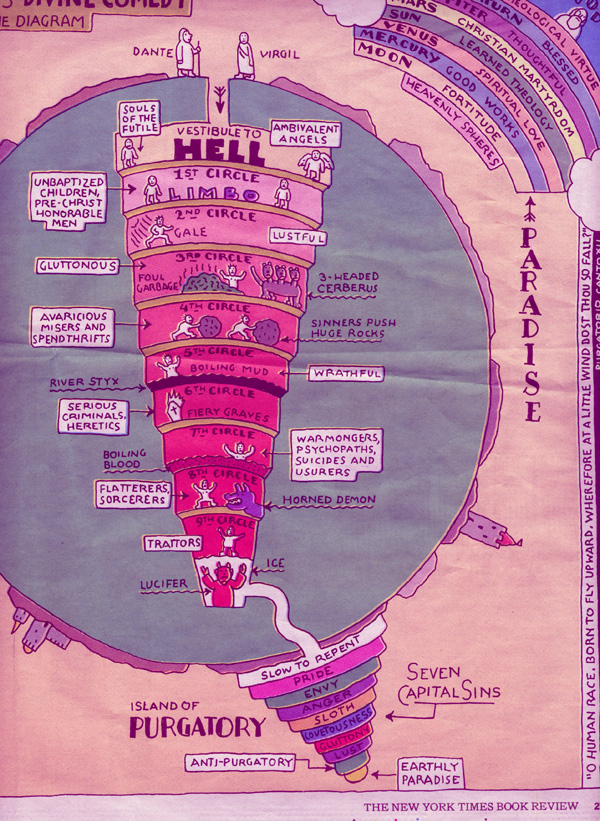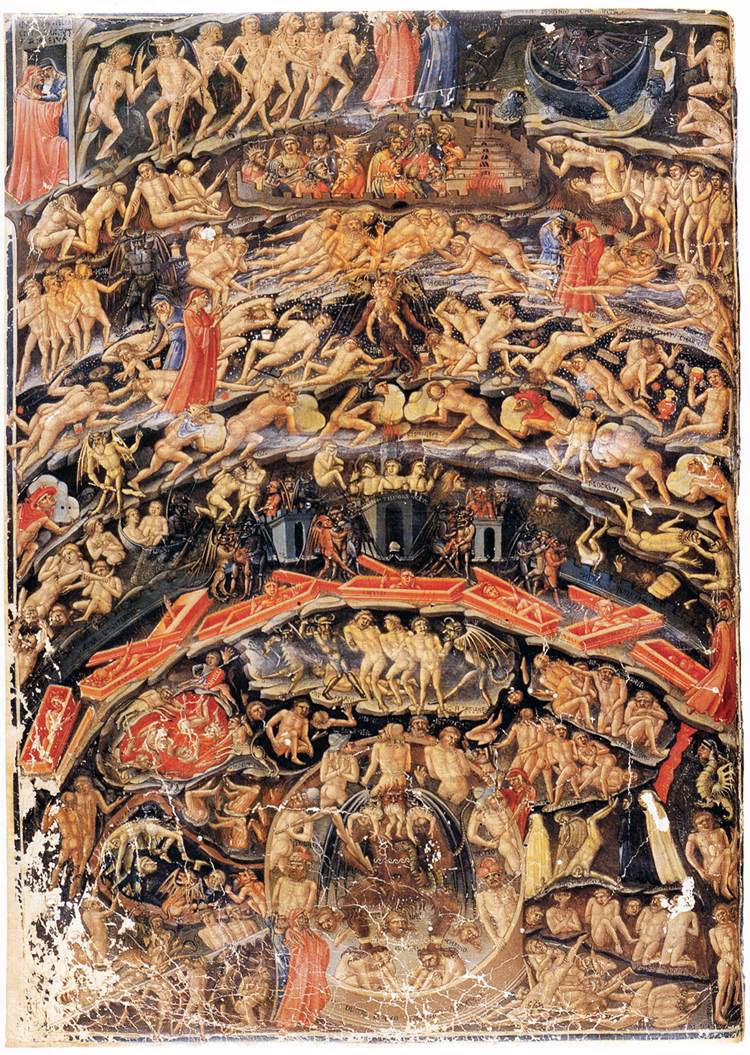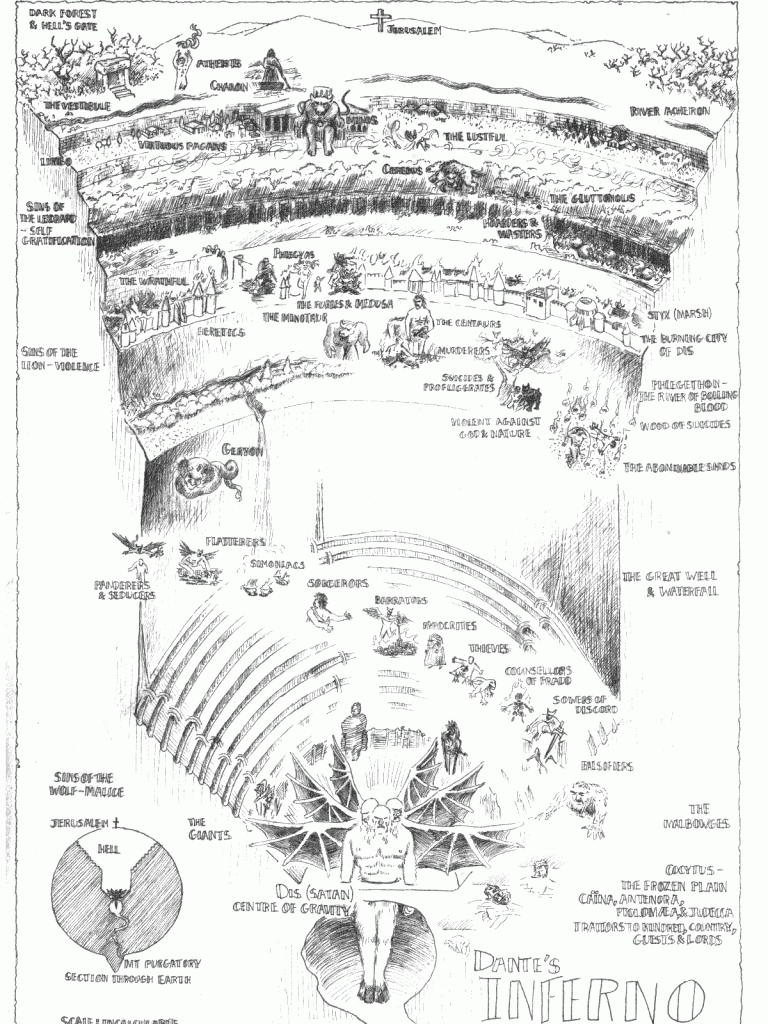The end of Purgatorio is my favorite part of the entire Divine Comedy, perhaps because it’s the point at which there seems to be the greatest human drama, the greatest sense of a story that has not yet been fully told and solidified into the cosmos. Dante’s confrontation and reconciliation with Beatrice is one of the few moments where he is not taking the role of an impervious (though not disinterested) observer. And it momentarily breaks the fabric of the entire epic, because Dante is no longer any sort of traditional epic narrator.
In XXXI, at the very top of Purgatory, Dante is dipped into the River Lethe, which will cause amnesia. The chant of Asperges me [purge me] accompanies his immersion, and he then forgets his past sins and his atonement for them is complete. (Even the memory of sin is apparently too polluted for the purified soul.)
Then, in XXXIII, Beatrice accuses Dante of having strayed from God’s way, and this bizarre exchange takes place between the two of them:
To that I answered: ‘As far as I remember
I have not ever estranged myself from You,
nor does my conscience prick me for it.’‘But if you cannot remember that,’
she answered, smiling, ‘only recollect
how you have drunk today of Lethe,‘and if from seeing smoke we argue there is fire
then this forgetfulness would clearly prove
your faulty will had been directed elsewhere.’Purgatorio XXXIII.91-99 (tr. Hollander)
For Dante as an epic narrator, there’s a problem in recounting these events. In writing the Divine Comedy, he has to remember remembering that he forgot the sins that he previously remembered. So he still remembers remembering having sinned.
Not even Lucretius and Lucan (probably the two most eccentric employers of the epic style prior to Dante, at least that I know of) had placed themselves in such a paradoxically unauthoritative position in their work. I don’t think Dante can resolve this knot without damaging his authority, and that humanizes the poem for me. It seems insolubly paradoxical. That seems to be the one crack in the otherwise hermetically sealed world he creates.
Dante needs such a move, of course, for his Christian narrative. It would not do for him to be an impersonal narrator in the way of the pagan epics, even a highly contentious and chummy one like Lucretius. Ironically, for all of Erich Auerbach’s emphasis on Dante’s portrayal of the organized human cosmos in Dante: Poet of the Secular World, this scene reifies the distinction that Mimesis makes between the more external, fatalistic Greco-Roman epic mentality and the inward-turning, single-person psychological focus that he sees born out of Judeo-Christianity. The modern, psychological “secular” world seems to arise out of the salvation myth itself and the necessity of mental moral purgation. Or, more frequently, the failure to do so.
(Even more ironically, the source for the forgetting is classical and pagan, the Lethe being a Greek invention. I won’t even speculate on the implications of this here.)
Nightspore added a comment generalizing this slippery loss of authority to the entire poem:
I think it refracts into all the addresses to the reader, all the moments when he has to reflect on himself: his apology at having to name himself, for example.
Again, specificity endangers authority.
I suspect Dante inherited at least part of this memory/forgetting framework from Augustine, who obsesses over time and memory to no end. In particular, there is this passage from the Confessions:
I can mention forgetfulness and recognize what the word means, but how can I recognize the thing itself unless I remember it? I am not speaking of the sound of the word but of the thing which it signifies. If I had forgotten the thing itself, I should be utterly unable to recognize what the sound implied. When I remember memory, my memory is present to itself by its own power; but when I remember forgetfulness, two things are present, memory, by which I remember it, and forgetfulness, which is what I remember. Yet what is forgetfulness but absence of memory? When it is present, I cannot remember. Then how can it be present in such a way that I can remember it? If it is true that what we remember we retain in our memory, and if it is also true that unless we remembered forgetfulness, we could not possibly recognize the meaning of the word when we heard it, then it is true that forgetfulness is retained in the memory. It follows that the very thing which by its presence causes us to forget must be present if we are to remember it. Are we to understand from this that, when we remember it, it is not itself present in the memory, but is only there by means of its image? For if forgetfulness were itself present, would not its effect be to make us forget, not to remember?
…Yet, however it may be, and in whatever inexplicable and incomprehensible way it happens, I am certain that I remember forgetfulness, even though forgetfulness obliterates all that we remember.
Confessions X.16
I’ve trimmed this passage; Augustine actually goes on at much greater length. Once you realize that Augustine is talking about sin in this passage, it becomes obvious why he is being so obsessive.
This paradox of memory as it relates to salvation and authority may be an indicator of the sort of problems Scholasticism faced in fighting off gnosticism, as posited by Hans Blumenberg. Worldly authority (especially in the form of narrative and memory) cannot survive when it is critically dependent on the idea of an otherworldly salvation and deity. More to come on this subject.



